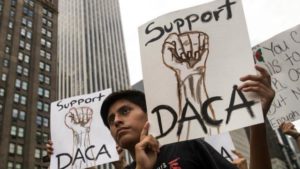
Both “DREAMers” and their employers are worried about how the wind-down of DACA will affect them, as a Trump administration deadline to find a deal on the young immigrant’s fate approaches.
The Senate failed to pass a replacement to the program last week, leaving Congress with few legislative options before the March 5 deadline. However, recipients of the program, who were brought to the country as children, won’t automatically lose their benefits that day.
In fact, because of two court injunctions in California and New York, current DACA recipients are allowed to apply to renew their DACA permit. The Supreme Court did not say after its closed door meeting on Friday whether it would hear the Trump administration’s appeal of one of those lower court rulings, but a decision on whether to grant or deny the case could come as soon as today.
When Attorney General Jeff Sessions announced the end of DACA, there were 689,800 registered recipients and under the terms of the memo ending the program, only beneficiaries whose permit ended before March 6 were allowed to reapply; those whose permit expired afterwards were allowed to use up the remainder of their permit, but not to apply for an extension.
If the injunctions are lifted without a replacement, DREAMers would lose their benefits and that would bring high costs to their employers and local economies. According to New American Economy (NAE), businesses would incur $1,769,400 in re-staffing costs and it would also mean a loss of local, state and federal taxes, and $339,864 in spending power lost every week.
“Right now, as more DREAMers lose status and American companies feel the economic pinch, it’s imperative the Senate get back to the drawing board and find a path to 60 votes,” said John Feinblatt, president of NAE.

Recent Comments